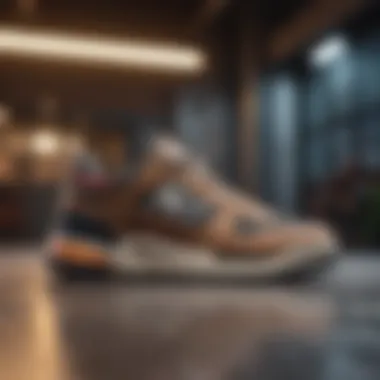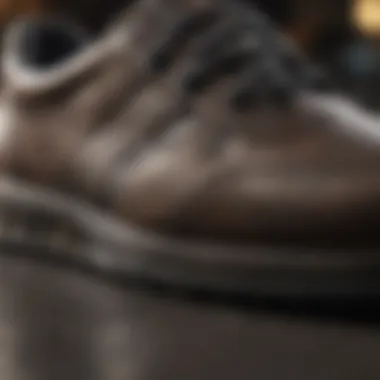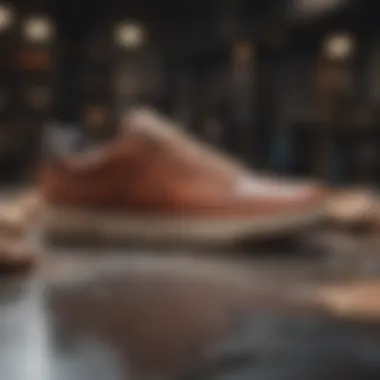Best Shoes for Standing at Work: A Comprehensive Guide


Intro
Many professions require prolonged periods of standing, which can lead to discomfort and even chronic pain over time. Choosing the appropriate footwear plays a crucial role in alleviating issues related to fatigue and health. The right shoes not only enhance comfort but also provide necessary support to maintain overall body alignment. This guide will delve into various factors that should be taken into account when selecting shoes for standing at work. Additionally, it will address specific needs based on different job roles, present expert recommendations, and offer practical advice on footwear maintenance.
Key Takeaways
- Comfort is imperative. Shoes should offer sufficient cushioning to absorb shock from standing and walking.
- Support matters. Proper arch and heel support help in maintaining alignment and reducing strain on the feet.
- Professional requirements. Different jobs call for distinct features; for example, a nurse may need slip-resistant shoes, while a chef may require waterproof options.
- Footwear maintenance. Regular care prolongs the life of shoes and contributes to overall foot health.
Relevant Statistics
- According to a study published in the Journal of Occupational Health, individuals who stand for long hours are at an increased risk of lower back pain, with nearly 60% of workers experiencing discomfort related to their footwear.
Practical Tips
To make informed choices about footwear for standing at work, consider the following actionable steps:
- Try before you buy. Always test shoes by walking around in them, ideally on the surfaces you will encounter at work.
- Replace worn shoes. Shoes lose their cushioning and support over time, so replace them when they show signs of wear.
- Consider insoles. Orthotic insoles can provide additional comfort and support tailored to individual foot structure.
- Maintain hygiene. Regularly clean and air out shoes to prevent foul odors and materials from breaking down.
- Rotate footwear. If possible, alternate between different pairs to allow each set to recover from daily use.
Implementing these habits not only enhances comfort but also promotes long-term foot health, which is crucial for professionals required to be on their feet for extended periods.
Prelude to Footwear for Standing Work
Selecting appropriate footwear is of utmost importance for those who spend prolonged hours on their feet. The right shoes can make a substantial difference in comfort, productivity, and long-term health. This is especially true in professions such as healthcare, retail, and services where constant standing is a norm. While other factors like work environment and job-specific tasks also influence comfort, footwear remains fundamental to reducing fatigue and preventing injuries.
The Importance of Choosing the Right Shoes
Choosing the right shoes is not merely a matter of personal preference; it directly impacts one’s health and efficiency at work. Proper footwear offers vital support to the feet, which is crucial for maintaining posture and balance. This, in turn, reduces the risk of developing musculoskeletal issues. For health professionals or anyone in physically demanding roles, the lack of adequate support can lead to severe back pain, joint problems, or even issues related to circulation.
For example, shoes with good arch support help distribute weight evenly throughout the foot. This provides alignment and support, especially when standing for extended periods. It is also essential to consider a shoe’s fit. Shoes that are too tight can cause blisters and discomfort, while loose ones can lead to instability. Consumers should prioritize comfort and functionality over style, leading to better performance in their roles.
Common Problems Associated with Prolonged Standing
Prolonged standing can result in a range of physical ailments. Foot fatigue is probably the most immediate effect. When weight is consistently applied to the feet without relief, it can lead to tiredness and pain. Additionally, a lack of proper cushioning can cause painful conditions like plantar fasciitis, a common inflammatory issue.
Other conditions that may arise include:
- Swelling of the feet and legs: Standing for too long can impede circulation, leading to swelling.
- Joint pain: Both knees and hips may experience strain from an improper foot position caused by inadequate footwear.
- Lower back discomfort: Poor posture due to inadequate support can lead to chronic lower back pain.
- Increased risk of varicose veins: Prolonged standing can compromise blood flow, increasing this risk.
Factors to Consider When Choosing Shoes
Choosing the right shoes is essential for those who stand for long periods. Proper footwear can alleviate discomfort and prevent long-term health issues. Each person's foot anatomy is unique, making it important to consider multiple factors before making a purchase. Understanding these factors can lead to better choices, enhancing comfort and overall well-being during work hours.


Arch Support and Stability
Arch support is one of the primary factors in shoe selection. The arch of the foot supports weight and absorbs shock. Proper arch support can help maintain proper body alignment, reducing strain on the legs and back. Shoes with inadequate support can lead to pain in the feet, lower back, and joints over time. It's crucial to evaluate the arch type—whether flat, normal, or high—when picking shoes. A shoe with the right support will distribute weight evenly, providing stability and preventing rolling inwards or outwards of the foot.
When recommending shoes, consider brands like Brooks or ASICS that are known for their supportive features. They offer a range of options suitable for various foot types.
Cushioning and Shock Absorption
Cushioning is vital in combatting fatigue. Quality cushioning reduces the impact on joints when walking or standing. Shoes that lack cushioning can cause discomfort and contribute to joint issues, especially during long shifts. Look for shoes with high-quality foam or gel inserts that provide cushioning. This is especially important for those who work in environments where hard surfaces are common.
Shock absorption, closely related to cushioning, is essential for minimizing stress on the body. Good shock absorption aids in lowering the risk of injury. You will find that many running shoes or specialized workplace shoes like those from New Balance emphasize shock absorbing materials.
Material Quality and Breathability
Material choices significantly affect foot comfort. Shoes that are made of low-quality materials may wear out quickly and fail to provide adequate support. Opt for shoes constructed from durable materials to withstand daily wear. Breathable materials like mesh allow airflow, keeping feet cool and dry throughout the workday. This feature is particularly important to avoid moisture build-up, which can lead to blisters and fungal infections. Leather shoes, while sturdy, may limit breathability. It's essential to weigh the benefits of durability against breathability based on individual needs.
Heel Height and Toe Box Width
Heel height can impact posture and foot health. Too much elevation can lead to discomfort and misalignment. Ideally, select shoes with a heel height of less than two inches for stability. This allows for proper weight distribution and balance.
Toe box width is also a crucial consideration. A narrow toe box can restrict movement and cause pain. Shoes with a wide toe box allow for natural foot expansion, enhancing comfort during long hours of standing. When selecting shoes, consider the style and how they fit overall; brands like Clarks and Skechers offer various widths in their styles, ensuring more people can find the right fit.
Shoe Types for Professionals Who Stand
The selection of appropriate shoes is crucial for professionals who spend long hours on their feet. Different shoe types cater to various work environments and personal preferences. This section details the variety of footwear options available, highlighting their specific elements, benefits, and considerations for those who stand throughout the day.
Athletic Shoes for Work
Athletic shoes are designed with functionality in mind. They typically offer excellent cushioning and support, making them a popular choice for individuals who engage in physical tasks or spend significant time walking. Features such as breathable materials and a flexible design enhance comfort and prevent overheating. When selecting athletic shoes for work, look for:
- Arch support, which helps reduce foot fatigue.
- Shock absorption, essential for protecting joints during repetitive impact.
- Durability, ensuring the shoes withstand the rigors of daily use.
Many brands offer models that blend performance with a professional appearance, suitable for a variety of workplace settings. This versatility makes them a favorable option.
Clogs and Slip-Ons
Clogs and slip-ons are favored for their ease of use and comfort. They are particularly popular among healthcare professionals and food service workers. Their design often allows for quick on-and-off access, which is practical in busy environments.
Some advantages include:
- Easy to clean, often made from materials that resist stains and spills.
- Comfortable footbed, providing support without compromising mobility.
- Non-slip soles to enhance safety on slippery surfaces.
However, it's essential to choose clogs that offer proper arch support and a secure fit to avoid slipping off during movement.


Supportive Dress Shoes
Supportive dress shoes combine style with functionality, making them a great choice for professionals who need to maintain a polished appearance while standing for long periods. Many models now incorporate comfort features commonly found in athletic shoes, such as padded insoles and comfortable outer materials.
When seeking supportive dress shoes, consider the following:
- Foot arch support that aligns with your foot type.
- Cushioning, especially in the heel area for shock absorption.
- Sufficient toe box space to accommodate natural foot placement and reduce pressure.
These shoes prove that practicality and aesthetics can coexist. Many brands are now developing lines that prioritize both elements to cater to the modern professional's needs.
Specialized Medical and Safety Shoes
In certain professions, especially in healthcare and construction, specialized shoes are crucial. These shoes are engineered to provide enhanced protection and support. Medical shoes, for instance, often feature slip-resistant soles and moisture-wicking properties, essential for maintaining hygiene and safety in clinical settings.
Key features to consider when selecting these types of footwear include:
- Steel-toe options for safety in industrial environments.
- Slip-resistant features, vital for reducing the risk of falls.
- Healthcare-specific designs, offering support for those who are on their feet all day.
These specialized shoes cater to the unique needs of different professions, making them indispensable for ensuring both safety and comfort during extended work hours.
Top Recommendations for Standing Shoes
Selecting the right footwear is essential for those who frequently find themselves on their feet at work. Comfort, support, and durability are critical factors to consider here. This section presents specific recommendations for different shoe types tailored for standing professionals. Each recommendation is meant to align with various work environments, from athletic settings to formal office spaces. By understanding the best options available, individuals can make more informed choices that enhance their daily work experience.
Best Athletic Shoes for All-Day Comfort
Athletic shoes serve many purposes, but they are particularly beneficial for individuals who need to remain standing for long periods. Nike Air Zoom Pegasus stands out for its excellent cushioning and breathability. Its lightweight design reduces fatigue throughout the day. ASICS Gel-Nimbus provides exceptional arch support, which alleviates pressure on feet. These options often feature advanced technologies aimed at shock absorption. Adequate grip and flexibility are also beneficial, allowing for natural movement whether walking or standing.
Top Clogs for Workplace Use
Clogs offer a unique combination of comfort and convenience, making them ideal for many professions. The Dansko Professional clogs are recognized for their sturdy construction and comfortable footbed. They help relieve pressure on the feet and are easy to clean, an advantage in clinical or kitchen settings. Another great option is the Birkenstock Professional's model, which provides a molded cork footbed that contours to the foot. Their slip-resistance surface also enhances safety in potentially slippery work areas.
Stylish and Supportive Dress Shoe Options
Balancing style with support is crucial in professional environments. The Clarks Unstructured line offers both elegance and comfort. These shoes utilize cushioned footbeds and breathable materials ideal for prolonged standing. Ecco is another brand that has successfully combined style and comfort in their line of dress shoes. The shoes often include flexible soles and good arch support. Opting for designs with ample toe box space further contributes to comfort. With these brands, individuals can remain professional without sacrificing foot health.
High-Quality Safety Shoes for Industrial Work
For those engaged in industrial work, safety shoes become a necessity rather than an option. The Caterpillar Second Shift boots provide excellent support alongside necessary safety features like steel toe protection. They are durable and built to withstand heavy use. The Timberland PRO 6" Pit Boss is another noteworthy option, known for its cushioned insoles and slip-resistant soles that enhance both comfort and safety. Investing in these shoes can ensure that long hours on the job do not lead to discomfort or foot-related issues.
"Proper footwear can significantly impact overall well-being for workers who spend extended periods on their feet."


Maintenance Tips for Longevity of Work Shoes
Caring for work shoes is essential for ensuring they not only perform well but also last longer. The importance of maintenance cannot be understated, especially for those whose jobs require prolonged standing. Regular upkeep keeps shoes in a good condition, maintains their comfort and support qualities, and ultimately protects your investment. Well-maintained footwear can help to prevent common foot problems and enhance overall workplace performance.
Regular Cleaning and Care
Shoes accumulate dirt, moisture, and odor over time, which can lead to a decline in performance. Regular cleaning helps to avoid damage and maintain hygiene. Here are some essential steps for effective shoe care:
- Remove dirt and debris regularly with a soft brush or cloth. This prevents buildup that can affect materials.
- Use suitable cleaning products appropriate to the shoe material. For leather shoes, use a leather cleaner. For fabric shoes, opt for mild soap and water.
- Allow shoes to air dry after cleaning, but avoid direct sunlight which can cause materials to fade.
- Apply a protective spray recommended for your shoe type to help resist water and stains.
Keeping shoes clean not only improves appearance but also contributes to their durability.
Proper Storage Techniques
How you store your shoes can affect their longevity. Proper storage helps maintain their shape and integrity.
- Store shoes in a cool, dry place. Avoid areas with high humidity to prevent mold and mildew.
- Use shoe trees or stuff them with newspaper to help retain their shape when not in use.
- Keep shoes away from direct sunlight and heat sources, as prolonged exposure can damage materials over time.
- If you have multiple pairs, consider using a shoe rack or box that allows air circulation.
Adhering to these storage practices ensures shoes remain in good condition and ready for use when needed.
Signs of Wear and When to Replace Shoes
Recognizing the signs of wear is vital to ensuring good foot health. Here are indicators to watch for:
- Inspect the outsole for grooves. If they are worn smooth, it's time to replace them.
- Check for holes or tears in the upper. These can lead to moisture intrusion and discomfort.
- Pay attention to any discomfort or pain while wearing. If shoes no longer provide support, they should be replaced.
- Look for any deformities in the shoe structure, such as a sagging heel or uneven wear on one side.
Understanding these signs can prompt timely replacements, helping to maintain comfort and prevent injuries during long work hours.
Closure: Making Informed Choices for Standing Work
Making informed choices about footwear for prolonged standing is critical for one's overall health and well-being. Footwear plays an essential role in providing the necessary support and comfort that individuals require when they are on their feet for many hours. The right shoes can minimize discomfort and prevent long-term physical ailments. This article has discussed various factors that influence shoe selection. Elements such as proper arch support, cushioning, and material quality are paramount in ensuring the feet remain comfortable throughout the day.
Moreover, individuals should consider specific needs based on their occupation. Whether one is a healthcare professional, retail worker, or involved in labor-intensive jobs, selecting suitable footwear can greatly affect performance and comfort. Investing in high-quality shoes is not merely a matter of style; it significantly impacts job satisfaction and personal health.
Overall, each component pertaining to shoe selection contributes to making educated decisions that resonate well with both occupational demands and personal preferences.
Recap of Key Points
- Importance of Comfort and Support: The significance of proper arch support and cushioning cannot be overstated. Shoes designed with these features reduce foot fatigue and pain.
- Material Quality Matters: Breathable and durable materials ensure shoes last longer. They also keep feet dry and comfortable.
- Specific Occupational Needs: Different professions require varying shoe features. Understanding these needs can enhance workplace performance.
- Regular Maintenance: Caring for shoes extends their lifespan, ensuring they remain beneficial over time.
Encouragement to Invest in Quality Footwear
Investing in quality footwear should be a priority for anyone who spends considerable time on their feet. It may seem tempting to choose cheaper alternatives, but such decisions can lead to discomfort and health issues in the long run. High-quality shoes often come with enhanced features that promote comfort, support, and durability.
By buying recognized brands such as Brooks, Dansko, or New Balance, individuals can often find better-fitting shoes tailored for prolonged standing. Spending money on footwear is a proactive step toward not just immediate comfort but also towards maintaining foot health. Remember, shoes are a form of personal support, and making wise choices can markedly influence one’s quality of life.
"Quality footwear can be a valuable investment in your health and productivity."
Prioritize your feet; they carry you through daily challenges.







